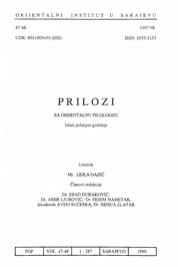NEKA ZAPAŽANJA O PRENOŠENJU TURSKIH USTALJENIH KOLOKACIJA NA BOSANSKI JEZIK
SOME OBSERVATIONS ON TRANSFER OF TURKISH SET COLLOCATIONS INTO THE BOSNIAN LANGUAGE
Author(s): Amina Šiljak-JesenkovićSubject(s): Theoretical Linguistics, Phonetics / Phonology, Syntax, Lexis, Semantics, Comparative Linguistics, South Slavic Languages, Philology, Turkic languages
Published by: Orijentalni Institut u Sarajevu
Keywords: Bosnian language; Turkish language; Set Collocations; Phonetics; Lexis; Idioms;
Summary/Abstract: On the basis of different examples of set collocations known of in the Bosnian and Turkish languages, this paper tries to bring some observations on the transfer of the meaning of Turkish set collocations into the Bosnian language. Introđuction, in addition to definitions of idioms and other set collocations, deals with the issues encountered when transferring them from one linguistic system into the other. Although definitions of such idioms point out the fact that they are untranslatable into other languages, given here are numerous examples of Turkish set collocations taken over by the Bosnian language and adapted phonetically and phonologically, adapted partially or in kalk. Phonetically-phonologically adapted Turkish collocations in the Bosnian language are marked as a characteristic of a speech community. The example of the expression bašum sagosum points to its use in this form, and to develop new meanings in its kalk in the Bosnian language. The author gives some notes , too, about possible translations of some Turkish set collocations from everyday communication, drawing attention to different possibilities of interpretation o f the same collocation, depending on the speech situation. Also, some curses and blessings in the Turkish language can be called idioms. Some of them, if literally translated, lose their meaning, while in the description of the meaning they lose their metaphoricalness. There are also examples that show possibilities of kalking these idioms, as well as transferring their meanings by stylistically and semantically close forms in the Bosnian language. Here have been recorded examples of Bosnian idioms with Turkish lexical corpus constituents, motivated by social relations, general experience or belief. On the basis of a large number of examples of synonymous Bosnian and Turkish idioms expressed with the same lexical and grammatical means within the two language systems, the author advances a hypothesis that those kalks are products of languages in contact, and parallel in the Turkish and the Bosnian languages he examines possibilities of varying those idioms within their firm structure. With regard to this, he defines some similarities. He also points out the metaphoricalness of the idioms as their feature.
Journal: Prilozi za orijentalnu filologiju
- Issue Year: 1997
- Issue No: 46
- Page Range: 61-81
- Page Count: 21
- Language: Bosnian

